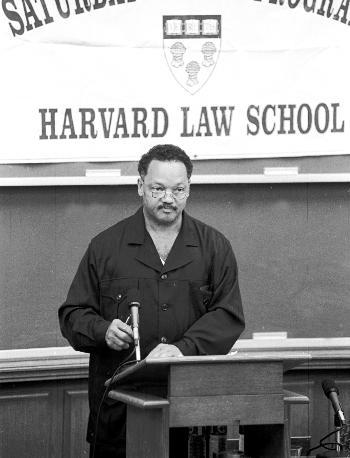
News
Pro-Palestine Encampment Represents First Major Test for Harvard President Alan Garber

News
Israeli PM Benjamin Netanyahu Condemns Antisemitism at U.S. Colleges Amid Encampment at Harvard

News
‘A Joke’: Nikole Hannah-Jones Says Harvard Should Spend More on Legacy of Slavery Initiative

News
Massachusetts ACLU Demands Harvard Reinstate PSC in Letter

News
LIVE UPDATES: Pro-Palestine Protesters Begin Encampment in Harvard Yard
Jackson Urges Restraint
Says U.S. should “build bridges” around the world

Warning the nation against “a war policy based on revenge and emotions,” the Rev. Jesse Jackson called for a global alliance against terrorism in a speech yesterday morning at Harvard Law School (HLS).
Calling attention to the estimated 500,000 orphans in Afghanistan, Jackson urged the U.S. to “build bridges” to countries such as Iraq, Iran and even Taliban-ruled Afghanistan, which he said have been alienated by the West.
Jackson, who said he has been busy in the past few weeks ministering to the victims of the Sept. 11 terrorist attacks and urging caution in foreign policy, addressed a packed Austin Hall classroom for more than an hour as part of a series of speakers in HLS’s “Saturday School” program run by Climenko Professor of Law Charles J. Ogletree.
The Austin Hall podium occasionally seemed more like a pulpit as Jackson exhorted his audience to remember the oppressed and the marginalized around the world who could be harmed by U.S. retaliation.
He also said that engaging Arab countries traditionally at odds with the U.S. through trade, diplomacy, and debt forgiveness could help prevent future terrorism.
“The economic insecurity of the desperate breeds these [terrorist] camps,” Jackson said.
But Jackson’s message was not only one of caution. He urged the country to “rally under the flag”—and to remember that “Muslims, Sikhs and those who look like Muslims” are Americans too and must not be persecuted.
Jackson compared the situation of the United States toa great boxer who after being knocked down rose from the canvas to defeat his opponent.
“The ground is no place for a champion,” he said. “You cannot let your faith wither on the canvas.”
But a knockout punch against Afghanistan is not what Jackson said he is looking for.
He said he has issued a set of values—advocating respect for international law, economic aid and concern for human rights and the poor—which he said should guide the Bush administration in preparing its response.
But his list of values, he said, has been rejected by government authorities for being “too soft.”
Jackson, however, said his approach is practical from a military standpoint as well.
He said the U.S. faces an intelligence deficit which could be remedied by diplomatic efforts toward usually shunned countries in the Arab world.
“People who we do not talk to have what we need,” Jackson said, speaking of U.S. intelligence findings on the whereabouts of those who committed the Sept. 11 attacks.
According to Jackson, the tragedy presents “a tremendous moment to build alliances.” He said he learned on past missions that economic sanctions and a lack of respect for the power of clerics in Muslim countries have hindered U.S. abilities to make peace.
Hostility towards what he called “deficit countries” is not consistent with his vision for what the U.S.’s role should be in the world.
“If we’re the light on the hill, we must put light in dark places everywhere,” he said.
After speaking at Austin Hall, Jackson held a brief press conference before heading to the Cambridge Rindge and Latin School.
He said it was important to address teenagers, who would be the ones fighting if there was a war in the near future.
Later in the morning, he also made a surprise appearance at the popular “Af-Am 10” class taught by Fletcher University Professor Cornel R. West ’74. Jackson took the microphone and lectured to the students for about 15 minutes.
Students in Jackson’s audiences throughout the morning generally expressed satisfaction with the work Jackson was doing in the wake of the terrorist attacks.
“He demonstrated a very good consciousness of the issues that are starting to affect the nation and the depths of understanding that the nation must have in order to move forward in these trying times,” said former president of the Harvard Islamic Society Zayed M. Yasin ’02, who attended Jackson’s HLS speech.
—Staff writer William M. Rasmussen can be reached at wrasmuss@fas.harvard.edu.
Want to keep up with breaking news? Subscribe to our email newsletter.
